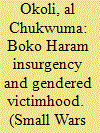| Srl | Item |
| 1 |
ID:
168224


|
|
|
|
|
| Summary/Abstract |
Boko Haram insurgency in North East Nigeria has exposed women (girls, ladies, and mothers) to a complex jeopardy. While some women have suffered untimely widowhood or child-lack as a result of the Boko Haram onslaught, others have suffered death, forced abduction, and allied assaults on the main and side lines of the insurgency. Oftentimes, women have faced direct violence that essentially degrade their humanity. This is evident in the deployment of women as war-front sex slaves, human shields, and suicide bombers by the insurgents. The virtual expendability of women in the context of Boko Haram insurgency has been vividly demonstrated by the gale of female suicide bombings in Nigeria over the recent years. By means of a textual and contextual analysis of library sources and/or documentary data, as well as an adroit application of the theory of objectification, this study posits that, in addition to suffering collateral vulnerabilities, women have equally been instrumentalized as objects of terror in the context of Boko Haram insurgency. The paper further argues that the ‘weaponization’ of women’s bodies as bomb vessels and human shields by the insurgents highlights the height of women’s corporal victimization and objectification in contemporary asymmetric warfare.
|
|
|
|
|
|
|
|
|
|
|
|
|
|
|
|
| 2 |
ID:
182474


|
|
|
|
|
| Summary/Abstract |
Armed banditry is prevalent in Nigeria. It has competed with insurgency for the soul of Nigeria’s national security. Contemporary trajectories of armed banditry in Nigeria have been full of complications. One of the complications is the emergence of crime lords who engage in a self-aggrandizing but also socially sensitive criminal career. This paper seeks to explore the phenomenon of ‘crimelordism’ as a new trend in armed banditry in Nigeria. Utilizing a mixed qualitative method, the paper posits that the prevalence of grossly under-governed territorial spaces, especially in the countryside and borderlands of Nigeria, has created a vacuum of security that is being exploited by criminal kingpins to establish enclaves of criminality where they wield and exercise quasi-territorial powers. The paper submits that ‘crimelordism’ holds critical implications for Nigeria’s national security in view of its ruinous impacts.
|
|
|
|
|
|
|
|
|
|
|
|
|
|
|
|
| 3 |
ID:
161123


|
|
|
|
|
| Summary/Abstract |
This article explores the phenomenon of herdsmen militancy as a new trajectory for the farmer–herder crisis in Nigeria, with reference to its humanitarian implications. Relying on a systematic analysis of secondary data and aligning with the analytical anchorage of liberal political ecology theory, the article posits that herdsmen militancy depicts a contradiction in agrarian relations in the context of a national security crisis which has been complicated by salient socio-ecological factors such as climate change, armed violence, and identity politics. In view of the dire humanitarian consequences of this situation, the article submits that herdsmen militancy constitutes a major threat to human and national security in Nigeria. It makes a case for a pragmatic policy capable of mitigating the myriad socio-ecological factors that tend to trigger herdsmen militancy, with prohibition on open grazing in critical hotbeds of herder–farmer conflict as a strategic measure.
|
|
|
|
|
|
|
|
|
|
|
|
|
|
|
|
| 4 |
ID:
193199


|
|
|
|
|
| Summary/Abstract |
This paper examines the phenomenon of crime–terror nexus from the standpoint of the linkage between banditry and Boko Haram insurgency in Northern Nigeria. Using a descriptive analysis predicated on a combination of primary and secondary studies, the paper reveals that both groups have functionally adapted each other’s structures and strategies. While Boko Haram and its splinter groups have occasionally engaged in acts of banditry, there has been mutual co-option by both groups as the exigencies of their operations demand. Nigeria’s drive at mitigating the banditry-terrorism conundrum must proceed with a pragmatic understanding of the gamut and dynamics of their situational nexuses.
|
|
|
|
|
|
|
|
|
|
|
|
|
|
|
|